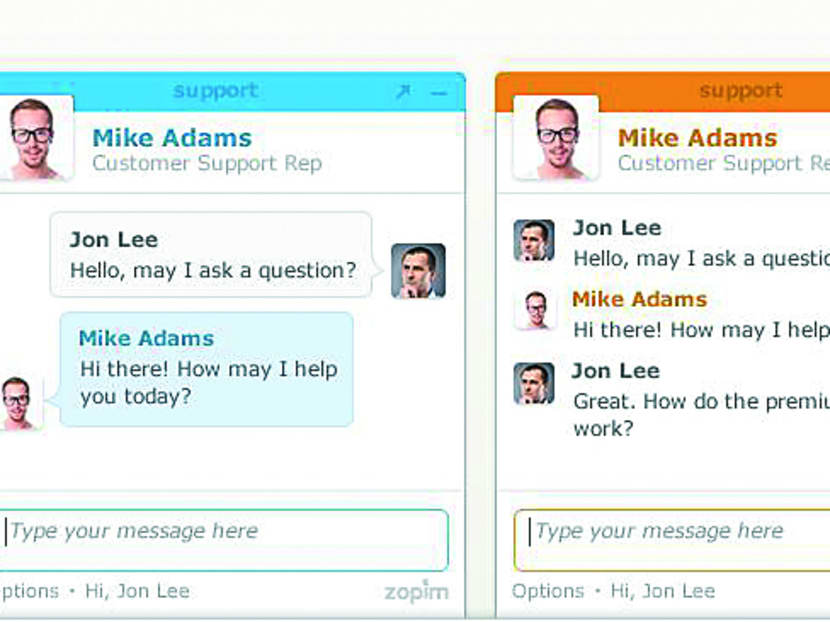US’ Zendesk acquires home-grown start-up Zopim for S$37 million
SINGAPORE — Home-grown messaging company Zopim has been acquired by San Francisco-based customer support firm Zendesk for as much as US$29.8 million (S$37.3 million) in yet another sign that Singaporean start-ups are gaining traction in the increasingly tight race for global investor dollars.
Zopim, which offers both free and paid live customer support chat software used by about 120,000 websites in 140 countries, was started by four students six years ago when they were in university. The four — Royston Tay, Wenxiang Wu, Yang Bin Kwok and Qing Ru Lim —struggled to get by, paying themselves several hundred dollars a month for the hours they put in each day. However, their persistence has rewarded them richly, turning them into multimillionaires now.
BUSINESSES PREFER PAID SOFTWARE TO FREE ones
In an interview with TODAY, Mr Tay, now Zopim’s Chief Executive, said yesterday that the pivotal point for the firm came in 2010, when, running low on funds, it was “forced to launch pricing” by starting a monthly subscription plan to what had been a free service.
“That turned out to be the defining moment. Businesses actually wanted to pay for software; not use free ones. Paid software implied reliability, quality and continuity. As first-time entrepreneurs, that taught us a valuable lesson on pricing and positioning,” said the 31-year-old.
The move paid off. Within a year, the start-up turned profitable as revenue grew 150 per cent annually to more than US$1 million in 2012. The firm also doubled its headcount yearly and has grown to more than 40 staff.
“In the same period, we raised some money from the National University of Singapore (our alma mater) and SPRING Singapore to make some really great engineering and design hires,” he added, commenting further on what turned the company around.
In a post published on the firm’s blog on Thursday, Mr Tay said that, in 2008, Zopim was founded with the vision of changing the way businesses communicate with customers online.
“We re-imagined live chat and the chat-widget design,” he added.
He also revealed how the start-up was acquired. “Late last year, we started conversations with a company we had admired for a while. It has a beautifully simple platform, is customer-focused, growing fast and well-liked. Our respect grew only when we started using its platform and built an integration for it. This company is Zendesk,” said Mr Tay, who had a one-year stint as a software engineer with FaceTime Communications in 2005.
THE NUS CONNECTION
The co-founders met while attending the National University of Singapore’s Overseas College Programme. As part of the initiative, they worked at Silicon Valley start-ups and also studied at Stanford University for a year.
After starting Zopim, they lived on a salary of S$500 a month each for two years as they struggled to keep the company afloat. In the early stages, the firm survived on seed funding from the Media Development Authority’s (MDA) i.JAM programme.
Zopim’s success story comes as Singapore start-ups have increasingly attracted million-dollar investments over the past year, when there were at least 30 such acquisition deals. The biggest deal to date is the estimated US$200 million takeover of Singapore-based video site Viki by Japanese e-commerce giant Rakuten last September. Last month, Singapore-based online beauty retailer Luxola raised US$10 million from a group led by Japan’s Transcosmos.
Zopim is the fifth start-up under the NUS Overseas College Programme to be acquired — a trend that NUS Enterprise, which heads the programme, says is gratifying.
“It is indeed gratifying to see our home-grown start-ups, which have emerged from the NUS entrepreneurial community, make a global impact and change the way the world works,” said Dr Lily Chan, Chief Executive Officer of NUS Enterprise.
“We hope this successful exit will help motivate many other technology start-ups, encouraging them to reach for greater heights,” she added.
The MDA said Zopim is one of the more notable success stories from the i.JAM programme, adding that the scheme’s indicators of success include acquisitions such as this.
The authority also observed a flow-on effect in terms of the changing attitudes of young people, who are now warming to the idea of starting their own high-tech companies.
CORE PRODUCT, PRICING TO REMAIN THE SAME
In his blog post, Mr Tay reassured clients and users that the company would not be making any major changes to the Zopim service in coming months. The core product and the monthly pricing would remain the same and any new features would be according to the company roadmap, he said.
Zendesk, which on Thursday filed plans with the US Securities and Exchange Commission for an initial public offering of up to US$150 million on the New York Stock Exchange, said Zopim chat software would be integrated into its customer-service platforms.
“We believe Zopim is a far superior product. It has a customisable widget and extensive feature set that we don’t have, so our future development efforts will be refocused (on) Zopim,” said Mr Adrian Mcdermott, Senior Vice-President for Product Development at Zendesk in a blog post.
According to the SEC filing, the purchase price for Zopim consists of an upfront payment of US$15.9 million, of which US$5 million will be in cash and US$10.9 million in shares. The other US$13.9 million in cash and equity will be paid after certain performance targets are met.
The increasing trend of Singaporean start-ups being acquired is a good sign that they are getting better at marketing themselves, said analysts. “We are starting to be able to better articulate the value of start-ups and speak the language of investors, so it is a good sign of things to come,” said Mr Clement Teo, Senior Analyst for Enterprise Telecoms and Mobility at Forrester Research.










